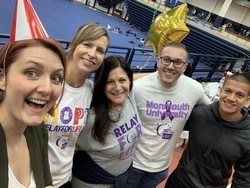The Monmouth University Writing Center helps students strengthen their writing skills and build confidence in their academic work. Offering free, one-on-one support with essays, research papers, and other assignments, the Writing Center is open to all students throughout the semester. However, according to Director of Writing Services Dr. Frank Fury, the biggest challenge isn’t helping students, it’s getting them to walk through the door.
“We try to advertise as best we can and market, but we also do presentations in classrooms, specifically composition classrooms,” said Fury. “All Monmouth students have to take first-year composition, so we figure, you know what, in all of the 50 sections of EN-101 that we offer each fall semester, we try to get into as many of them as we can.”
These classroom presentations, often led by the writing assistants themselves, allow students to learn firsthand how Writing Services can support them, not just from professors but from peers who understand their challenges.
“It’s one thing for the professor to advocate and encourage students to use our services,” Fury said. “But it’s another thing to hear from someone who actually works in Writing Services.” Allie Mason, a junior majoring in communication with a concentration in journalism and public relations and one of the Writing Center’s assistants, is one of those voices helping to bridge the gap.
“In my role at the Writing Center, I provide support to students seeking help with essays, research papers, and other academic writing projects,” Mason said. “During the beginning of the semester, multiple writing assistants get assigned freshman classes where we give a small presentation and introduce what the Writing Center is. I got to do a few presentations myself this year and really enjoyed it.”
In addition to classroom visits, the Writing Center promotes its services through social media, flyers, email campaigns, and even tables set up in the Student Center with candy giveaways. But despite these efforts, Mason said many students still don’t take full advantage of what’s offered.
“No, I don’t think many students take full advantage of the free resources available on campus, including the Writing Center,” she said. “Unfortunately, many of the students who do make appointments are often required to by a professor. I wish more students would seek out these services on their own initiative.”
For the students who do visit, the impact is clear. “I get a lot of students that I connect with during their first appointment, and then they continue to come back,” Mason said. “After meeting with them a couple times, I can absolutely see progression and confidence in that student. It’s super exciting to see.”
The Writing Center’s busiest times are typically midterms and finals, when appointments surge. Still, Mason said students of all majors and backgrounds use the service. “When I first started working here, I thought it would mostly be communication students, but there’s definitely a variety,” she said. “I just helped a student this week with their biology research paper!”
That variety reflects the Center’s mission to serve everyone, but some students, particularly outside writing-intense majors, don’t see it as a necessary resource.
Lauren Hess, a junior majoring in business administration with concentrations in finance and economics, said that while she’s heard about the Writing Center, she’s never felt the need to use it. “I’ve heard about it a few times from my freshman year English teacher, but as a business major, very few teachers talk about the Writing Center,” Hess said. “The only thing I really know about it is that they can proofread your papers before you turn them in.”
Like many students, Hess said she relies on digital tools for writing help. “Honestly, I think the Writing Center is unnecessary due to all of the help you can find online through resources like AI and Google,” she said. “I’m not against tutoring — I go to the Math Learning Center often — but I just don’t feel that the Writing Center is for me.”
Still, Hess admits that she sometimes struggles with writing long papers or crafting strong thesis statements. “Sometimes I have good ideas, but I’m not sure how to structure them clearly,” she said. “I often find my writing getting repetitive.”
When asked what might make the Writing Center more appealing to students like her, Hess suggested better outreach and approachability. “Maybe more advertising showing real students who use it, or professors sharing positive experiences,” she said. “Also, drop-in hours or short ‘paper check’ sessions could make it feel less intimidating.”
Despite her hesitation, Hess said she recognizes the value the Writing Center provides. “Writing is a big part of most classes, so having support like that can really improve grades and confidence,” she said.
Fury understands this mix of awareness and hesitation all too well. “There’s a little bit of nervousness,” he said. “When you go to a tutoring session or writing service session, you’re in a vulnerable state. But once students get past that initial anxiety, they usually find it’s very helpful.”
Mason agreed that overcoming that initial fear is key and that word of mouth plays a powerful role in doing so. “I truly believe that word of mouth is the most effective way to encourage students to visit the Writing Center,” she said. “When a student hears from a close friend about how helpful Writing Services was for them, it might be the motivation they need to go themselves.”
Ultimately, both Fury and Mason emphasize that the Writing Center is more than a proofreading service, it’s a community of support that helps students become stronger, more confident writers.
“The strength of our services is our writing assistants,” Fury said. “They’re intelligent, well-trained, and they genuinely care about helping students. Once students experience that for themselves, they realize there’s nothing to be nervous about — we’re here to help them succeed.”



